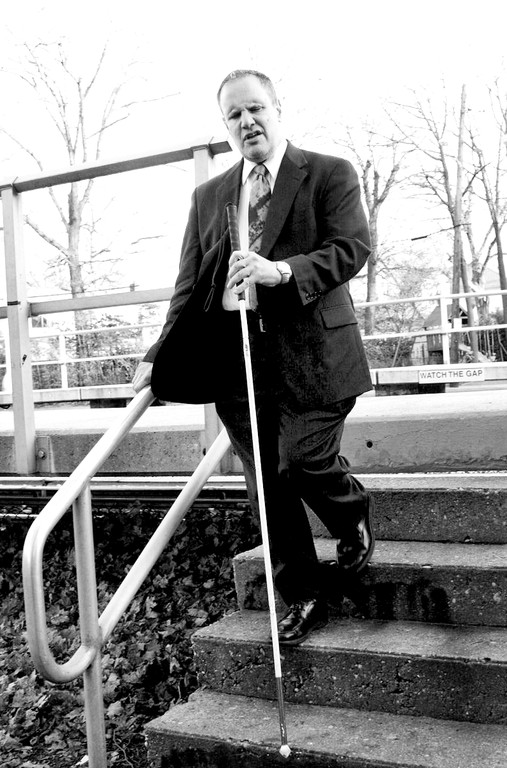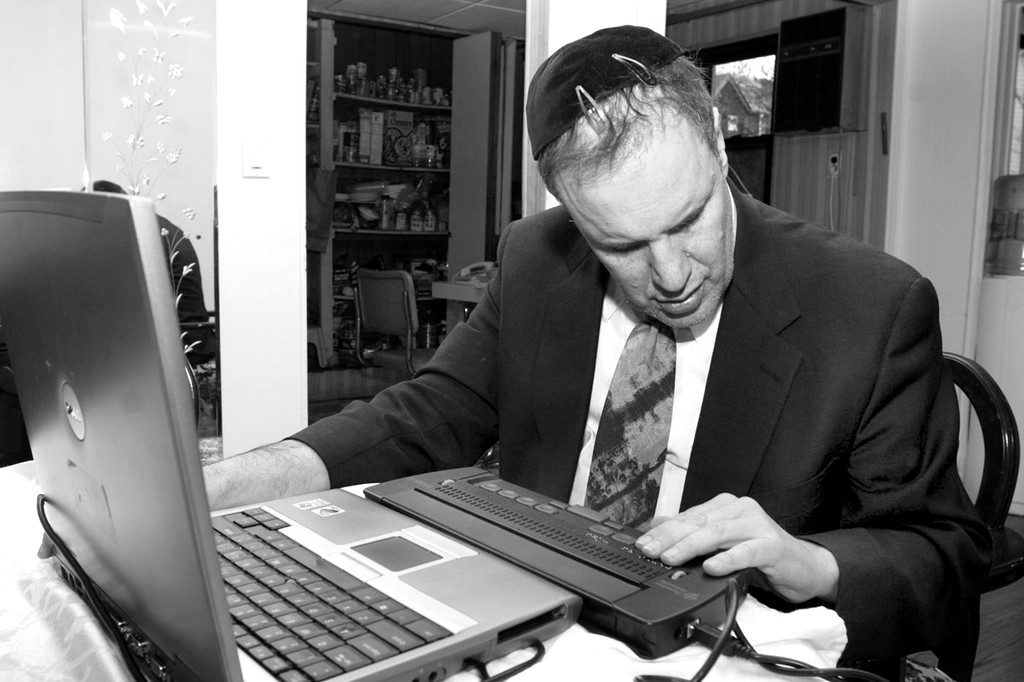Woodmere rabbi drives disability empowerment
Yad HaChazakah celebrates chanukat habayit with Flatbush open house
Yad Hachazakah, the Jewish Disability Empowerment Center, is celebrating a chanukat habayit of their new home at 1389 East 18 St. in Flatbush, with an open house on Thursday, Dec. 5, and Sunday, Dec. 8.
Rabbi Michael Levy, a Woodmere resident and active member of Congregation Aish Kodesh, has been a board member of Yad since its founding in 2006. Blind since birth, he raises awareness and seeks donations for Yad, speaking at schools, camps and shuls and contacts organizations to improve accessibility.
This new home will house a “model center, our own space … that we fully control and can design to reflect who we are,” said Sharon Shapiro-Lacks, founding director of Yad HaChazakah. She has been a leader in disability policy in the independent living movement for more than 25 years and now brings this self empowerment and advocacy to Jewish communities.
The center is one floor down, accessible by elevator and is decorated with 16 posters presenting varied perspectives on disabilities.
The Slingshot Foundation, an organization that pinpoints nonprofits worthy of funding, highlighted Yad in this year’s guide supplement on disabilities and inclusion. Slingshot noted that Yad is “led by and for persons with disabilities and commits to including Jews with disabilities in all aspects of the organization’s decision making.”
It described the organization as, “Tirelessly advocating for inclusion and disability rights within the Jewish community, Yad HaChazakah strives to change misconceptions and eradicate stigmas about persons with disabilities. The organization gives persons with disabilities a voice in the Jewish community and provides them the tools they need to live better lives. In addition to individual support, Yad HaChazakah also works with national and New York-based Jewish organizations to help improve disability awareness and accessibility standards, serving as a vital force in breaking down barriers that prevent Jews with disabilities from participating in all aspects of Jewish life.”
In an email interview with the Jewish Star, Levy cited two ways of viewing disability. One is the medical model, that people with disabilities (PWD) are “passive recipients of service with no autonomy” and that the problem is the patient, and the patient must adjust to society.
The other view, he said, is that people with disabilities are a minority and that barriers in society prevent their integration into society, including print only books, inaccessible buildings and transportation, and the attitude that PWDs are special needs and should be segregated. Levy stated that these barriers “exist in the Jewish community. It was time for us to empower ourselves, and, following the independent living model, work to change the system and, whenever possible, to remove or minimize the barriers.”
Yad HaChazakah’s brochure states that they provide “guidance, resource information, advocacy and support networks for people with obvious or hidden disabilities/health conditions and their families while we promote access to Jewish community life within the framework of Torah.”
Since more than half of their board members have disabilities or health conditions, they are experts in living with disability and are often best able to support and assist each other. They work to help individuals use their own abilities and cultivate resources to manage daily living at home, to date, marry and raise children, work or volunteer, access learning opportunities and fulfill mitzvot and participate fully and contribute to the community.
Yad provides guidance, support, networking, groups, mentors, and works to change attitudes towards the disabled and expand access and inclusion for people with physical, visual and auditory disabilities to shuls, yeshivas, stores, mikvahs, events and agencies. They can help access vocational training, long term care, shadchanim and singles events; Braille, large print or recoded Torah related texts; better wheelchair access to one’s home, shul or yeshiva; daily living assistive devices and communication technology, sign language interpreters, and benefits and subsidies.
Rabbi Levy was born in New Jersey and “attributes his achievements to G-d’s beneficence and to his courageous parents.” He was born blind and, unlike most blind children in the 50s, attended the local public school. He earned his bachelor’s degree in psychology and a master’s degree in social work from Columbia University. He visited Israel, studied at Hebrew University and received Rabbinic ordination. Levy has worked at the Brooklyn Center for Independence of the Disabled, the Jewish Guild for the Blind and as a part time chaplain at Roosevelt Hospital.
Since 1993 he has worked as the director of travel training for MTA NYC Transit. Michael is married to Chava Willig, a writer, editor, lecturer and author of “A Life Not with Standing,” an autobiography, and about her challenges as a polio survivor. They are bound by their love of Judaism, and love of words, language and music. The Levys have two children, one married, and one grandchild.
Michael said that opening the center on Chanukah was significant. “The Maccabees were a movement from within the people, asserting their right to live as they chose, not condemned to live according to the decisions of others. We want Jews with disabilities to know they have choices about how to conduct their lives. In the Chanukah Haftarah: Zechariah chapter 4, the navi is reminded that “not by strength and not by valor, but by My Spirit, says Hashem Tsvakot.” There is a long history in Judaism of the supposedly weak rising to positions of leadership.”
He sees this new center, in addition to their location at 419 Lafayette Street in New York City, as a place to show people how to “empower themselves, helping them integrate into their Jewish communities, showing them how to advocate and advocating with them when shuls, schools, places of employment, shadchanim, bus companies that transport children to Jewish schools, etc., act in ways that keep them segregated.”
Said Lacks, the goal is “to help our communities make it possible for Jews with disabilities to participate as fully as possible in Jewish life and to build leadership capacities within Jews with disabilities. “
The new center will hold discussion groups, workshops and programs. For reservations and more information call Leah Weinstein at 646-723-3955 or email openhouse@yadempowers.org. To learn more go to: www.yadempowers.org

 46.0°,
Light Drizzle
46.0°,
Light Drizzle 







